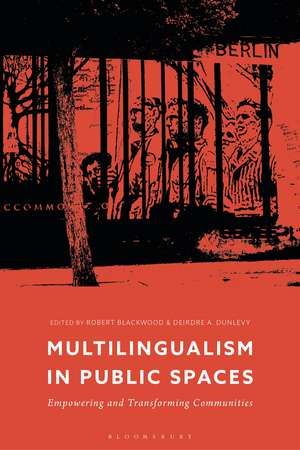Multilingualism in Public Spaces: Empowering and Transforming Communities
Editat de Dr Robert Blackwood, Dr Deirdre A. Dunlevyen Limba Engleză Hardback – 11 aug 2021
| Toate formatele și edițiile | Preț | Express |
|---|---|---|
| Paperback (1) | 192.19 lei 6-8 săpt. | |
| Bloomsbury Publishing – 22 feb 2023 | 192.19 lei 6-8 săpt. | |
| Hardback (1) | 544.83 lei 3-5 săpt. | +29.54 lei 6-12 zile |
| Bloomsbury Publishing – 11 aug 2021 | 544.83 lei 3-5 săpt. | +29.54 lei 6-12 zile |
Preț: 544.83 lei
Nou
Puncte Express: 817
Preț estimativ în valută:
104.27€ • 108.57$ • 88.12£
104.27€ • 108.57$ • 88.12£
Carte disponibilă
Livrare economică 14-28 februarie
Livrare express 30 ianuarie-05 februarie pentru 39.53 lei
Preluare comenzi: 021 569.72.76
Specificații
ISBN-13: 9781350186590
ISBN-10: 1350186597
Pagini: 268
Ilustrații: 10 bw illus
Dimensiuni: 156 x 234 x 22 mm
Greutate: 0.55 kg
Editura: Bloomsbury Publishing
Colecția Bloomsbury Academic
Locul publicării:London, United Kingdom
ISBN-10: 1350186597
Pagini: 268
Ilustrații: 10 bw illus
Dimensiuni: 156 x 234 x 22 mm
Greutate: 0.55 kg
Editura: Bloomsbury Publishing
Colecția Bloomsbury Academic
Locul publicării:London, United Kingdom
Caracteristici
The first book to explicitly tackle the potential of multilingualism to empower individuals, groups and communities, with specific emphasis on identity, diversity, and social cohesion
Notă biografică
Robert Blackwood is Professor of French Sociolinguistics at the University of Liverpool, UK. Deirdre A. Dunlevy is a Lecturer in Applied Linguistics at the University of Limerick, Ireland.
Cuprins
Introduction, Robert Blackwood (University of Liverpool, UK) and Deirdre Dunlevy (University of Edinburgh, UK)1. Multilingual Inequality in Public Spaces: Towards an Inclusive Model of Linguistic Landscapes, Durk Gorter (University of the Basque Country, Spain)2. Demarcating the Space for Multilingualism in Czechia: An Ethnic Majority's Ways to Restrict Others' Language Use, Marián Sloboda (Charles University, Prague, Czechia)3. Empowering Multilingualism? Provisions for Place-names in Northern Ireland, Mícheál Ó Mainnín (Queen's University Belfast, UK)4. The Transformative Power of Linguistic Mobility: Evidence from Italian Borderscapes, Stefania Tufi (University of Liverpool, UK)5. Invisible Presence?: Polish in Norwegian Public Space, Toril Opsahl (University of Oslo, Norway)6. Place-names and the Complexity of Language Recognition in Northern Ireland, Deirdre Dunlevy (University of Edinburgh, UK)7. Post-colonial Re-memorization in the Public Space: A Patrice Lumumba Square in Brussels, Luk Van Mensel (University in Namur, Belgium)8. Linguistic Landscape Activism as a Means of Community Empowerment: Direct Action, Ai'Ta and Breton in France, Robert Blackwood (University of Liverpool, UK)9. Multilingualism in the Model Multicultural City: The Influence of Authors in Leicester's Golden Mile, Michelle Harrison (University of Leicester, UK)10. Empowering Speakers of Less Prestigious Varieties in Formal Education: Greek Cypriot Dialect in Preschool Education in Cyprus, Andry Sophocleous (University in Nicosia, Cyprus)Conclusion, Robert Blackwood (University of Liverpool, UK) and Deirdre Dunlevy (University of Edinburgh, UK)Index
Recenzii
This inspiring volume offers a fascinating mapping of the complex relationship between power, multilingualism and public spaces. Through rich case studies of multilingual practices and choices across different public spaces, the writers provide crucial insights to the forces that shape linguistic landscapes and the ways in which communities and their members can belong and participate.
In critically questioning the phenomena of both multilingualism and public space, this volume showcases the convoluted processes of presence and invisibility of multilingualism within Europe (and beyond). Together, the chapters convincingly demonstrate how multilingualism can be understood as a means of social transformation. A must-read for scholars within the fields of linguistic landscapes and multilingualism studies.
A timely collection about how multilingualism may enrich and variegate public space, and in so doing, may empower speakers. This excellent book will engage a wide readership concerned with questions of how to live harmoniously with others in cultural and linguistic difference.
This excellently edited book not only achieves considerable progress with regards to examining multilingualism and empowerment, but will likely serve as inspiration for future work on these topics-both within and outside of Europe.
In critically questioning the phenomena of both multilingualism and public space, this volume showcases the convoluted processes of presence and invisibility of multilingualism within Europe (and beyond). Together, the chapters convincingly demonstrate how multilingualism can be understood as a means of social transformation. A must-read for scholars within the fields of linguistic landscapes and multilingualism studies.
A timely collection about how multilingualism may enrich and variegate public space, and in so doing, may empower speakers. This excellent book will engage a wide readership concerned with questions of how to live harmoniously with others in cultural and linguistic difference.
This excellently edited book not only achieves considerable progress with regards to examining multilingualism and empowerment, but will likely serve as inspiration for future work on these topics-both within and outside of Europe.
